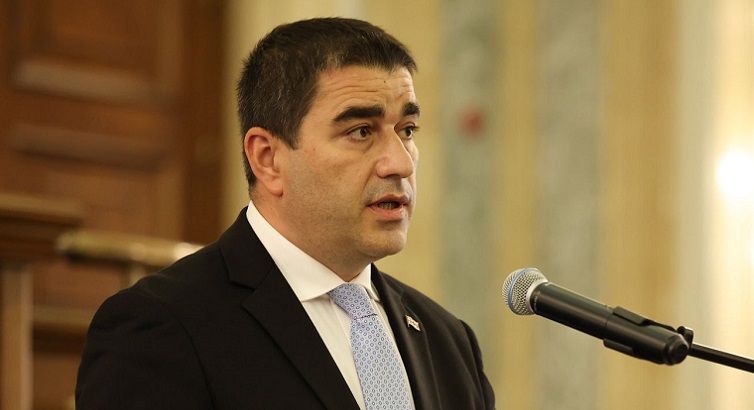Parliament Speaker highlights “big progress” against “severe challenges” on anniversary of fall of capital of Russian-occupied Abkhazia

Georgian Parliament Speaker Shalva Papuashvili on Wednesday commented on the anniversary of the 1993 fall of Sokhumi. Photo: Parliament press office
Georgian Parliament Speaker Shalva Papuashvili on Wednesday said his country had demonstrated “great and unexpected progress for many” over the past 30 years despite “severe” security challenges, in comments on an anniversary of the 1993 fall of Sokhumi, the capital of the Russian-occupied north-western region of Abkhazia, during the war in the region.
We must believe that this very dark day of recent history was only the beginning of the better future that we Georgians dream of”, the official said in his social media post, in which he stressed “important achievements” for the country were “still ahead”.
Papuashvili said the latter included strengthening of national independence, restoring national unity and fully integrating into the European Union and NATO.
In his comments the senior official also claimed “Russia's imperial ambitions” three decades ago had “proved stronger” than the efforts of the international community “to see a united and free Georgia”, and added “our quest to restore historical justice and achieve the centuries-old dream of generations collided with the deadly reality of force-based international politics”.
However, he noted Georgia had shown “unexpected strength for many” since the date and succeeded in creating democratic institutions, restoring order, “successfully combating” crime and corruption, “defeating authoritarianism”, reducing poverty, getting closer to NATO and the EU, “maintaining peace” and ensuring “economic development”.
All these have been accomplished in the past 30 years, which may be unimaginable for many other nations. This achievement and progress gives us hope that what happened on September 27, 1993, will remain the most painful event in the history of Georgia's independence, and in the future we will have more important successes in achieving our national goals”, he said.
The regional capital of Sokhumi fell after the Abkhaz side in the year-long conflict violated a ceasefire agreement between the sides on July 27, 1993 and launched an assault on the city on September 16, after the Georgian side had withdrawn most of its defences as per the agreement.
Between 13,000 to 20,000 ethnic Georgians and approximately 3,000 Abkhaz have been reported killed during the 1992-1993 conflict, which lasted for 13 months and 13 days. Over 250,000 Georgians fled the region and became internally displaced in the country, while more than 2,000 - including about 1,500 ethnic Georgians, up to 200 ethnic Abkhaz and about 100 ethnic Ossetians - were declared missing.
 Tweet
Tweet  Share
Share